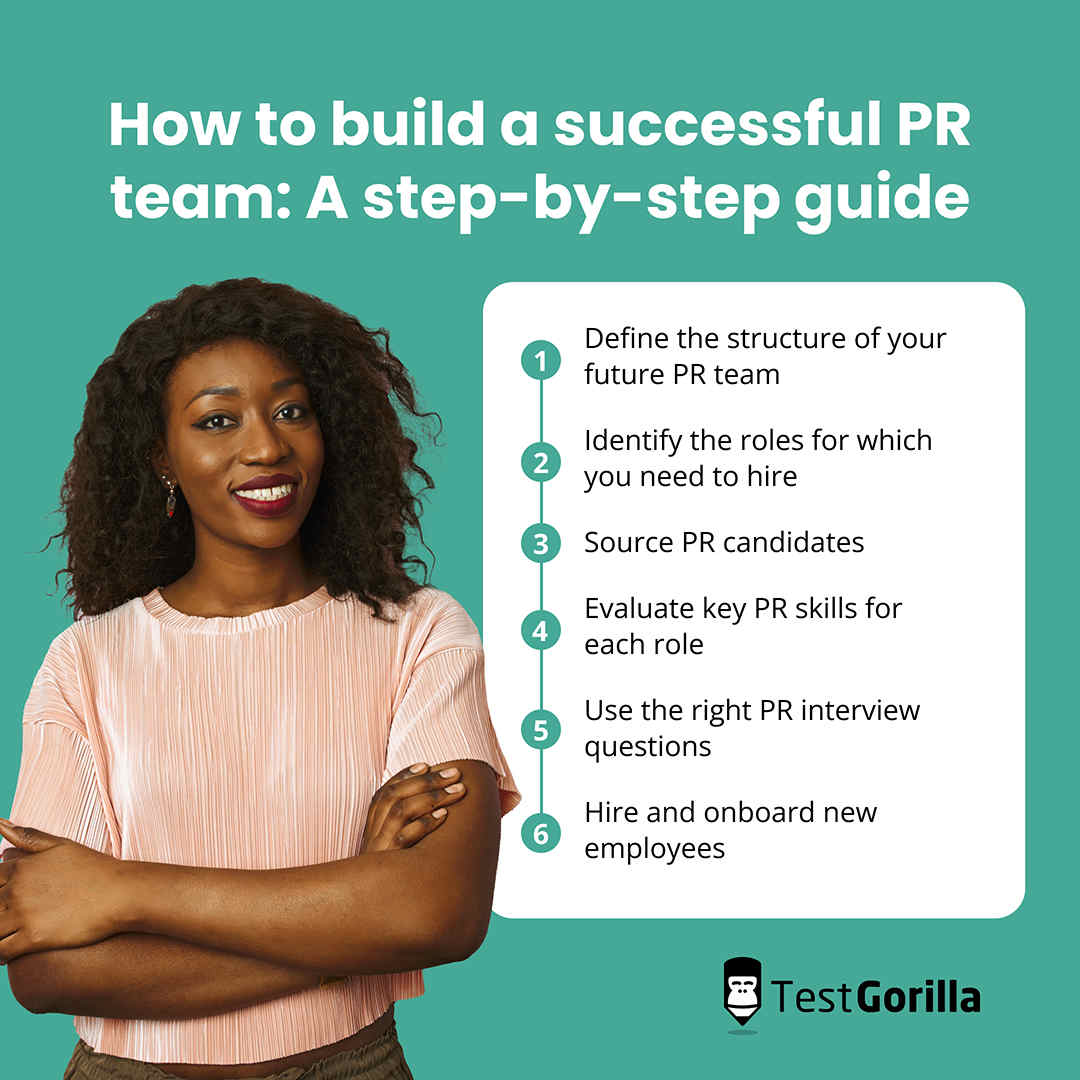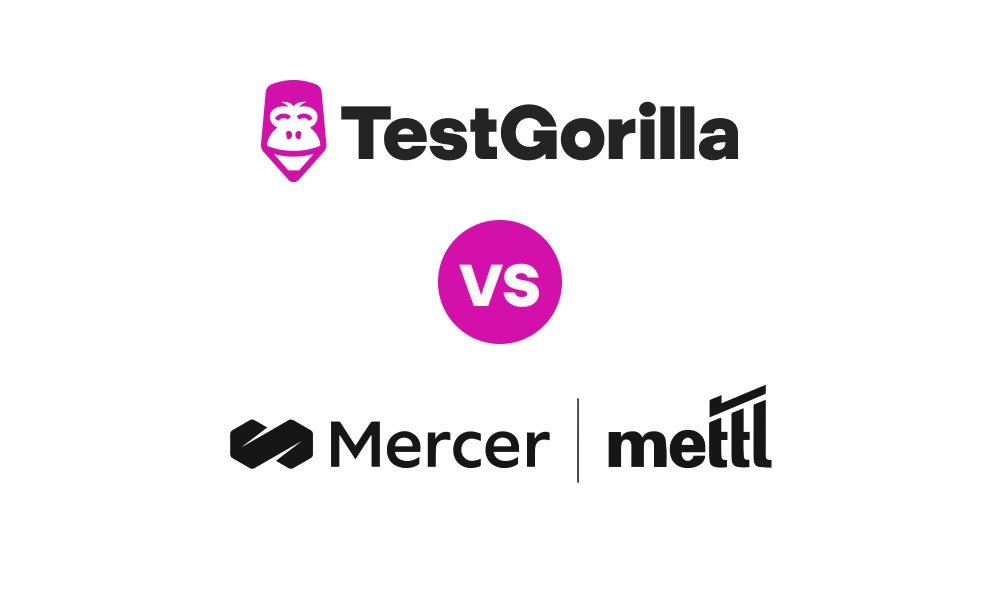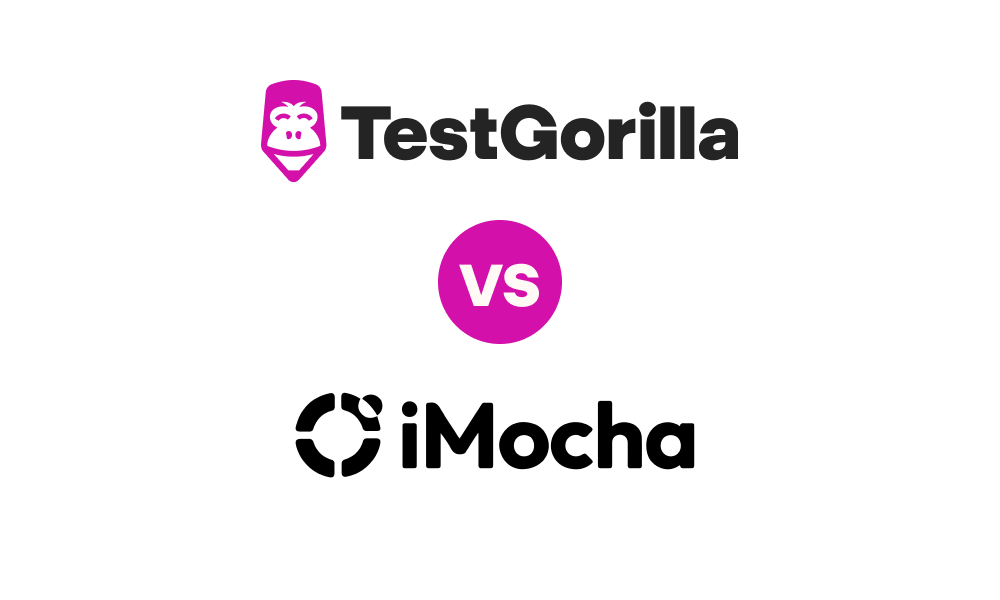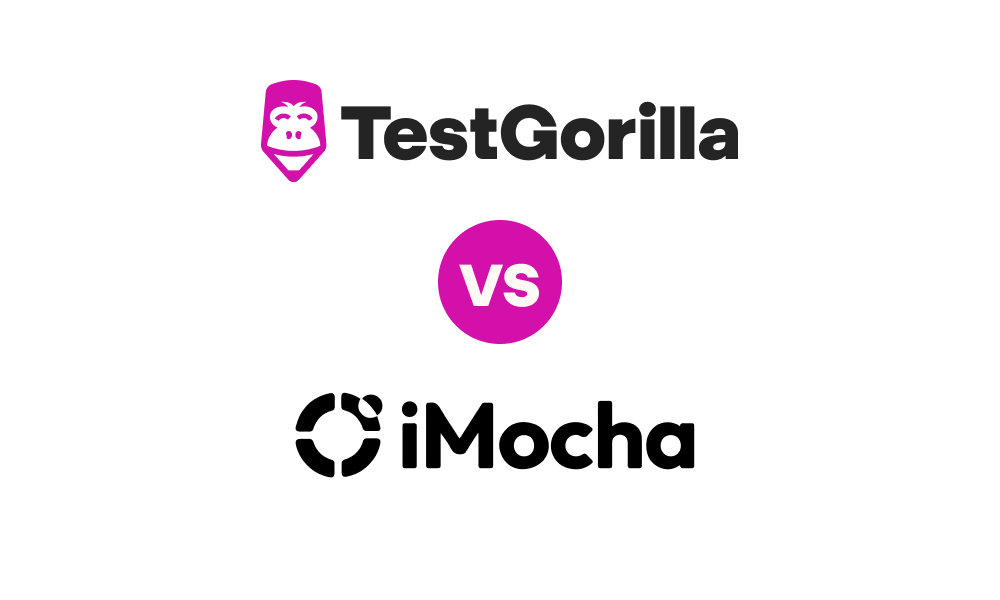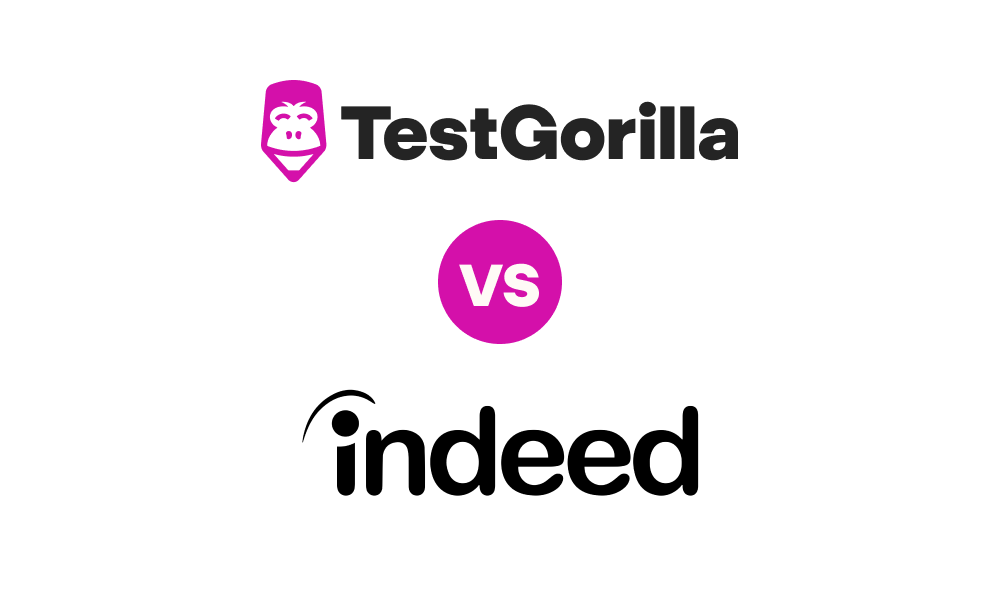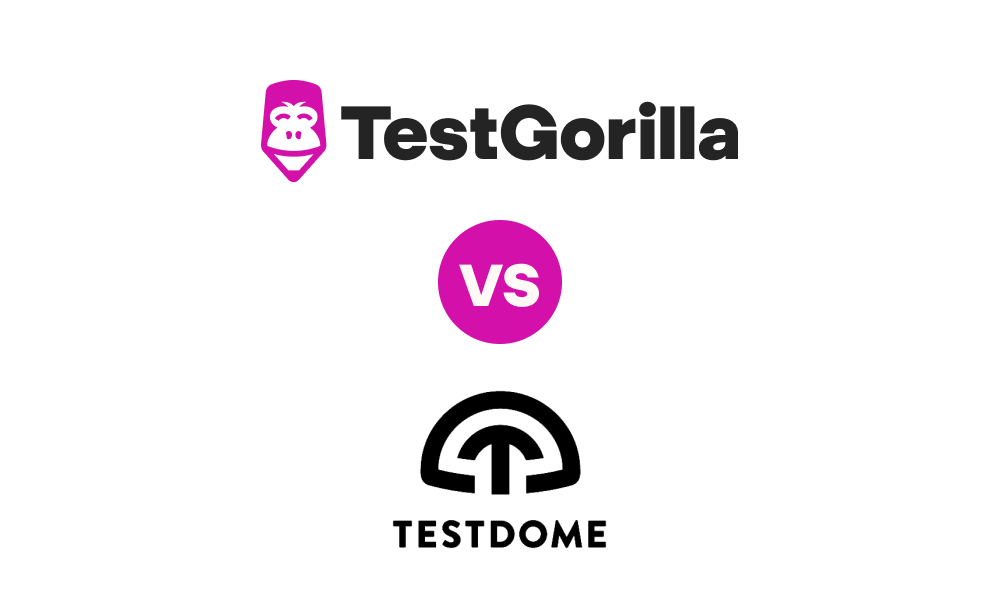A Public Relations (PR) team is responsible for maintaining a positive brand image, building brand awareness, and dealing with crisis management.
Your business must be prepared for everything in an ever-connected world where news moves at lightning speed. One wrong tweet or misguided ad can ruin your reputation and, with it, your entire business. At the same time, the right message at the right time can skyrocket sales, and a good PR team should be able to handle both crises and opportunities with ease.
In this guide, we’ll go over how to build and manage a successful PR team. We’ll focus on the following topics:
What PR teams do
What the most essential roles in every PR team are
What skills to look for when hiring candidates and how skills testing works
And a step-by-step process of how to build your first PR team
Follow our guide to avoid common pitfalls in the PR hiring process, and you’ll create an efficient PR team in no time.
Table of contents
What do PR teams do?
Your PR team manages and shapes your public image and communications with the public and the media. Its main goal is to promote brand awareness and maintain your reputation with your clients and stakeholders. At the same time, the PR team handles reputation crises and tries to avoid them at all costs, whenever possible.
A wrong tweet or ad can ruin a business. This is why you need to make a clear distinction between your PR team and the marketing team; the two have overlapping duties, and it’s easy to mistake them.
The main goal of your PR team is to boost reputation, while the main goal of your marketing team is to drive sales. The marketing team may have a brilliant idea for a product or sale, but if it goes against your brand image, the PR team needs to step up.
That is why the two teams need to work together to build effective strategies that’ll not only polish your brand’s image but also help to sell your products. Overall, the main goals of your PR team are to:
Maintain a positive public opinion
Protect your reputation
Do crisis management
Oversee the creation of content that aligns with your company goals
Provide counsel on all levels of the organization when it comes to communication with different stakeholders
What are the most essential roles in a PR team?
When building your PR team, you must know what you’re looking for. Depending on the size of your organization, some roles might overlap with others.
The most essential PR roles are:
Director of Public Relations
The PR director is responsible for all client-facing communication and interacts with the public on your behalf.
They work with all other members of your PR team to write speeches, make press releases, communicate with media outlets, and handle all other press inquiries. They’ll also be the ones to deal with conflict resolution whenever necessary.
Overall, the PR director is responsible for your PR team and how they handle all public relations for your business.
Social media manager
The social media manager is in charge of the public perception of your company on social media.
They create, post, and moderate content, handle customer feedback, de-escalate negative situations, and work with other PR specialists to maintain the integrity of your brand in the public’s eye.
Branding strategist
A branding strategist is responsible for developing effective branding strategies that will create a unique vision of your brand in the minds of your customers and stakeholders.
The branding strategist must consider your ideal customer – whether they’re an end consumer or a business – follow trends, and foresee market demand for products or services you might decide to offer in the future. They’ll use these factors in accordance with your market and help steer your company in the right direction.
The overall goal of the branding strategist is to increase your brand’s visibility through the above means.
Copywriters
Copywriters are the engine that brings your PR team’s ideas to life. They will write all the copy for your website, ads, and products and work closely with the social media manager to maintain your online reputation.
Bear in mind that all of the above require different copywriting skills. One person may be an excellent public relations copywriter but write poor product descriptions. This is why you might need to find different copywriters for the different tasks you have planned – or find one who’s good in many different types of copy.
Skills to look for when building a PR team
Now that you have an understanding of what roles you should be looking for when hiring a PR team, you need to know what skills to look for when starting to build it.
Below, you’ll find the most essential skills every PR specialist should have.
Communication
Perhaps it’s a no-brainer, but every PR specialist in your team should have outstanding communication skills.
The main job of everyone in your PR department is to communicate, either verbally or in written form. They should be able to:
Communicate in a professional manner with all internal and external stakeholders
Discuss your business’ position and products with stakeholders verbally or in writing
Respond to inquiries by phone, chat, and email
Have empathy and understanding when working with others
Listen carefully to feedback and take it into account
Build rapport with clients and other team members
Problem solving
When it comes to PR, problem-solving is a must-have skill.
Your PR specialists will sometimes have to dodge negative feedback from clients, and they need to do it in a way that not only alleviates the problem but also helps maintain a positive relationship.
According to PwC, in the US, 59% of customers will walk away after a few bad experiences, while 17% will do so after just one. This is why your customer’s experience is everything, and your PR team needs to be able to think on the spot and solve issues as they come up.
One wrong move or a delayed response can mean customers turning away from you and your business and going to a competitor. With excellent problem-solving skills, you can keep those customers for longer.
Critical thinking
Critical thinking is an important skill to have when you’re constantly talking to clients and the press.
Whether it’s for helping define the messaging for a new product, drafting up a new sales ad, or managing a reputation crisis, your PR team should be able to gather data, conduct research, and use what they’ve learned in a creative way.
There won’t be a one-size-fits-all solution to every issue, so a combination of creative and analytical thinking can go a long way.
Teamwork
Building a PR team requires hiring people who are ready to work together for the good of your business.
You want to look for candidates who can work in a team, exchange ideas together, and ensure your brand’s image remains pristine.
Candidates with teamwork abilities will be:
Self-aware
Honest
Responsible
Great communicators
Positive people
Organizational skills
Organizational skills cover everything from time management and planning to delegating and prioritizing tasks.
Candidates with great organizational skills can stay focused on their projects, meet deadlines, and keep records of their activities, which can be used to improve your internal processes.
Crisis management skills
Being able to identify problems and deal with them beforehand is an essential skill to have when working in PR.
Crisis management skills are essential for your PR team as they allow them to minimize disruption of business workflows and take the necessary steps to avoid reputation damage.
How to build a successful PR team: A step-by-step guide
This section will focus on building your PR team step-by-step. Follow it to find the right candidates with the right skills.
1. Define the structure of your future PR team
As with all other teams in your company, structure is key. It helps maintain control and keeps people responsible.
As mentioned before, your PR team will depend on the size of your business. Smaller firms only need a few PR specialists who work closely together. Larger companies will have different specialists for the different types of work they need to do: copywriting, social media, crisis management, and more.
You’ll also need to have a PR director who’ll be in charge of the team; everyone else will report to them. As your company grows, you’ll know how many team members you need for each role and expand from there.
2. Identify the roles for which you need to hire
The next step is to identify what roles you need to hire for.
Consider your priorities and what you want to achieve. Is it building your reputation, reaching out to more people, or managing crises?
Based on this, you can decide what type of candidates you’re looking for and how many you’ll need.
Apart from that, consider whether you want to build an inside PR team or contract an agency. If you have an immediate issue that needs resolving and don’t have time to source candidates, it might be better to outsource your PR tasks. However, that means you’ll need to allocate more resources for that endeavor.
3. Source PR candidates
Next, you need to find the right candidates using an attractive public relations job description. Consider the following options:
Social media: You can source candidates on social media, and especially LinkedIn. Use filters to find professionals in your area who have the skills you’re looking for.
Public Relations Society of America: You use PRSA's job center to find PR professionals in the US.
Freelance: Find freelance PR specialists on websites such as Upwork and Fiverr.
Referrals: Finally, use your professional network to see if anyone has recommendations for skilled PR professionals they’ve worked with in the past.
4. Evaluate key PR skills for each role
The best way to find the right PR candidates is through pre-employment skills testing.
This method will help you save time and resources, and you can be assured the candidates you choose will have the necessary skills for the job.
TestGorilla offers many skills tests that can aid you in the process. Our top picks for evaluating PR candidates are:
Public relations strategy: Find candidates who know how to build and execute successful PR strategies.
Communication: This test enables you to find expert communicators who can convey key messages clearly and concisely at all times.
Problem-solving: PR professionals need to be expert problem solvers. Assess their skills with this test.
Critical thinking: Critical thinking is essential for dealing with challenging and unexpected situations, of which there are many in PR. Evaluate applicants’ skills with this test.
Social media management: Find applicants who know the ins and outs of social media management and can help you build a consistent social media presence.
SEO copywriting: PR and marketing teams often work together, so making sure your copywriters have the right SEO skills can be very useful.
If hiring for leadership positions, you can also use our Leadership and People Management test to find candidates who know how to influence, inspire, and guide others, or our Business Ethics and Compliance test to see if applicants can navigate ethical dilemmas (for example, during a crisis) with moral integrity.
5. Use the right PR interview questions
Once you assess skills, you can invite your most skilled candidates to an interview for a more in-depth evaluation of their strengths and weaknesses. Here are some questions you could use when hiring a PR team:
How do you measure the success of a PR campaign?
What PR tools and software are you familiar with?
Can you describe a time when you had to manage a PR crisis?
What is your approach to building relationships with the media?
Can you discuss a time when you had to change your PR strategy mid-campaign?
How do you handle negative media coverage?
What are the key components of a successful media kit?
How do you ensure brand consistency across different PR channels?
How do you align PR strategies with overall business goals?
How do you evaluate the ROI of a PR campaign?
How do you manage and resolve conflicts between a business' public image and the private actions of its leaders?
Can you discuss a time when you had to use unconventional PR tactics?
What is your approach to managing PR campaigns across multiple countries and languages?
What is the most challenging aspect of PR for you, and how do you manage it?
How do you assess and manage the risks associated with a PR campaign?
6. Hire and onboard new employees
Once you’re done with your skills assessments and interviews, it’s time to extend an offer to your best candidate(s). Once they accept, it’s time to onboard them.
A well-designed onboarding process will help your new employees settle into their new roles easily. For this, you need to:
Prepare all the paperwork beforehand
Set up a training schedule
Facilitate introductions with the rest of the team
Give your PR team the right tools to succeed
A great onboarding program can be the difference between someone staying with you for many years and doing an amazing job or them leaving after only a few weeks. So, make sure to put in the effort to onboard your new PR employees the right way to reap the benefits in the long term.
7. Use the right PR tools
Maintaining a positive brand image and staying on top of the game can be easy if you have the right tools at your disposal. Below, we’ve compiled a list of several of the best PR tools to help you achieve maximum results in the world of public relations.
These tools will help your PR team with media monitoring, content distribution, media outreach, collecting and analyzing data, and more.
Top PR tools to use:
Muck Rack
OnePitch
Prowly
Onclusive
PrPropel
Cision
Hire the best PR team with TestGorilla
If you’re at the right stage of growth, hiring a PR team can do wonders for your business.
From building better brand awareness and maintaining positive relations with your clients and stakeholders to successfully navigating challenging situations that risk damaging your image, your PR team can help you build a brand that’s aligned with your mission, vision, and values.
In this guide, we gave you a step-by-step process for hiring an effective PR team. Now, it’s your turn to make all that happen.
Sign up for TestGorilla’s free plan or book a demo with one of our specialists to start building your PR team today.
Related posts
Hire the best candidates with TestGorilla
Create pre-employment assessments in minutes to screen candidates, save time, and hire the best talent.
Latest posts
The best advice in pre-employment testing, in your inbox.
No spam. Unsubscribe at any time.

Hire the best. No bias. No stress.
Our screening tests identify the best candidates and make your hiring decisions faster, easier, and bias-free.
Free resources
This checklist covers key features you should look for when choosing a skills testing platform
This resource will help you develop an onboarding checklist for new hires.
How to assess your candidates' attention to detail.
Learn how to get human resources certified through HRCI or SHRM.
Learn how you can improve the level of talent at your company.
Learn how CapitalT reduced hiring bias with online skills assessments.
Learn how to make the resume process more efficient and more effective.
Improve your hiring strategy with these 7 critical recruitment metrics.
Learn how Sukhi decreased time spent reviewing resumes by 83%!
Hire more efficiently with these hacks that 99% of recruiters aren't using.
Make a business case for diversity and inclusion initiatives with this data.

